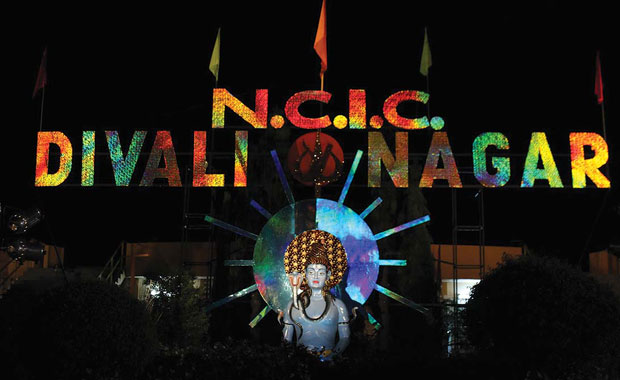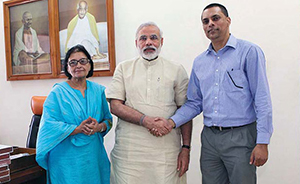The Divali Nagar
The National Council of Indian Culture (NCIC), Trinidad and the Caribbean’s premier cultural organization on Friday launched its publication, “Culture Persistence” before a large audience at Divali Nagar, Chaguanas, Central Trinidad.
The book highlights the NCIC’s 50th anniversary, 1964-2014, in the promotion and enhancement of Indian culture—songs, music, dance, art and exhibition.
But its flagship activity is the annual Divali Nagar which has now become a major cultural and religious landmark here, the Caribbean and worldwide, as far as India itself.
Prime Minister Kamla Persad-Bissessar, in her message to mark the NCIC’s 50th anniversary applauded the organization as a seat of learning, where members of the East Indian community and the wider society may educate themselves on various aspects of East Indian life—-from language to dance to a deeper knowledge of religion and spirituality.
“Your signature event, the Divali Nagar, is now world-renowned as a biggest celebration of the Festival of Divali on an amazing showcase of East Indian cultural traditions. It has always been one of the proudest moments of my life to have been invited by the NCIC as Chief Guest of the Nagar in 1996,” the Prime minister said.
Ms Kamla Persad, who is the country’s first woman/East Indian Prime Minister and whose forefathers came here from Bihar in the 19 century, said that Divali Nagar has consistently provided a space for young East Indian artistes to showcase their talents. “For many of these young people, to perform at the Nagar is a rite of passage…badge of honour…an opportunity to share their talents with family and friends”, she noted.
“Divali presents a visual treat for onlookers and is one of significant events that highlight Trinidad and Tobago as a multi-ethnic and multi-religious society. It was brought to the country by Indian indentured immigrants from India in 1845 and is usually celebrated during October/November each year.”
One of the highlights of the proceedings was the announcement by its President, Dr Deokienanan Sharma that the NCIC will open a digital research centre soon and it would opened for scholars, writers, researchers and thinkers from across the globe to do their writings and research. Dr Hansley Hanoomansingh who originally conceptualised Divali Nagar and who is now the Honorary Life President, in a nail-biting dissertation, pronounced that in the midst of the resistance, the Indian community persisted but at the same time contributed in large measure to the evolution of the society and to a model multi-cultural society.
“For the most part, the NCIC has captured the spirit of our ancestors who in the transition from barracks to communities revealed the ideal concept of jahajibhai…brother reaching out to brother. That mobilization of volunteers responding to an idea has resulted in a permanent home for Divali Nagar, the first Hindu theme park anywhere in the world,” Dr Hanoomansingh writes.
Public Relations Officer of the NCIC, Mr Surujdeo Mangaroo aptly describes the NICIC as, “the new vehicle which emerged in the sixth decade of the 20thcentury as having given a new clout, a new impetus, a new vision for the Indian diaspora, and without it the Indian diaspora would be found wanting through no fault of theirs because the state had remained adverse to the diaspora cause. However, it has changed and changed profusely.”
Indian High Commissioner, Shri Gauri Shankar Gupta, noted that the NCIC has also contributed enormously to the cultural landscape of Trinidad and Tobago by hosting and staging performances of the cultural troupes coming from India over the years. These activities have further cemented historic cultural bonds with India.











Comments.